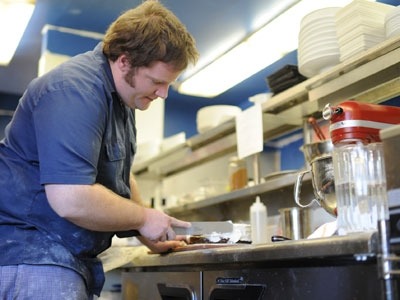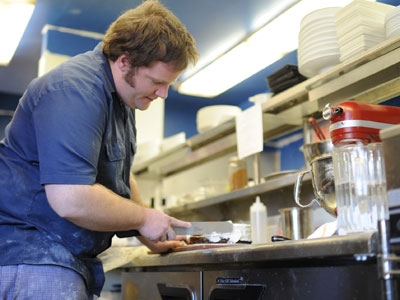Should I Make My Own Wedding Cake?
Wedding cakes are expensive. According to a recent study* by TheKnot.com, the average price for a cake is $512, with 11% of brides spending upwards of $750. So it's no surprise that when planning a wedding, many couples will trim their budget by adding a D.I.Y. component to the celebration as a way to personalize the event. Some assemble their own wedding favors that coordinate with the theme, like packages of cheese and crackers for a wine country wedding, or s'mores for a celebratory bonfire at the after party. Others will forgo the cake completely in favor of a selection of pies or cakes baked by friends and family — or a giant wheel of cheese.
Brookville Restaurant in Charlottesville, Va., adding a personal touch to his wedding means making his own cake. And he wasn't going to go for a simple, traditional layer cake, either, but a decadent four-tier cake serving over 140 guests, decorated in flowers. Keevil is best known for his culinary prowess in the kitchen — in particular, his savory and meaty dishes — so making a professional-style cake, his own nonetheless, is uncharted territory. "At the restaurant, we make everything ourselves, like the bread, the pies, so I've done some baking, and I learned a lot in culinary school, but this my first attempt in cake decorating."
So as a chef and owner by night, what's it like to spend the rest of the days leading up to his wedding baking his cake? "It's kind of stressful," said Keevil when we talked to him two days before the wedding. He had just started baking the layers that morning, "but I think I'd do it better than anyone else," says Keevil. When told his bride-to-be, Jennifer Pendleton, a co-owner and manager of Brookville, she didn't object either, "she just asked 'Are you sure you're up for the challenge?' and I was." For him and his bride, the choice to make their own cake wasn't to save money (but with normal cakes costing about $8 a slice, and commonly upwards of $400, it can be a money-saving option). "I care deeply about the person I'm making it for, and it's going to be the best it can possibly be."
While most wedding cakes are made of a simple yellow or chocolate cake batter, Keevil and his bride opted for something more adventurous — layers of both carrot cake and pound cake. "It started out as all carrot, because that's Jennifer's [his fiancée] favorite," says Keevil, "Then one night I made a pound cake at the restaurant." Needless to say, it was an instant hit — and his bride instantly decided the pound cake was going to have to be a part of the cake, too, finished with a generous covering of lemon cream cheese frosting and a garnish of flowers to match the bouquets.
For Keevil, the greatest challenge wasn't going to be the sheer amount of work needed to make and bake the cake — that just takes time, carefully planning, and the right pans. It was going to be his own desire to make the cake perfect. "It's all for her [his bride], so it has to be right the first time." Then again, the fact that each layer was to be transported separately, in the trunk of his car, and assembled on site wasn't going to be a piece of cake, either.
Making your own wedding cake is like baking a traditional cake, just on a larger scale, says Keevil. He's shared some key tips to ensure success:
1. Make sure the layers are level and structurally sound after they are baked and cooled. With pound and carrot cakes, each layer is apt to be heavy, so it is important to insert wooden dowels into each layer to support the layer on top, each set on a double layer of corrugated cardboard.
2. Prepare your mise en place carefully. "It's crucial to have everything weighed out, with specific measurements, and ready to go in front of you."
3. Carefully read the recipe instructions to ensure you don't miss a step.
4. Have a clear plan of attack. Know exactly what you need to do, and by when.
5. Allow yourself plenty of time for each step. Bake the cakes first and allow plenty of time for them to cool completely. Prepare the frosting, and stack the layers for each cake. Then coat each cake with a thin coat of frosting, a "crumb coat," to seal in the moisture. When wrapped tightly in plastic wrap, the frosted cakes will keep for up to two to three days before the cake is to be served. The day before the wedding, Keevil removed the cakes from the refrigerator to allow them come to room temperature, and then added the final layer of frosting.
6. Ensure you have a way to transport the cake. The morning of the event, Keevil transported the four layers in his car to the site, assembled it on site and covered any gaps with extra piped frosting. The florist then decorated it with flowers just before the ceremony.
Click here for the Pound Cake recipe.
Click here for the Carrot Cake recipe.
*TheKnot.com & WeddingChannel.com 2010 Real Wedding Study

